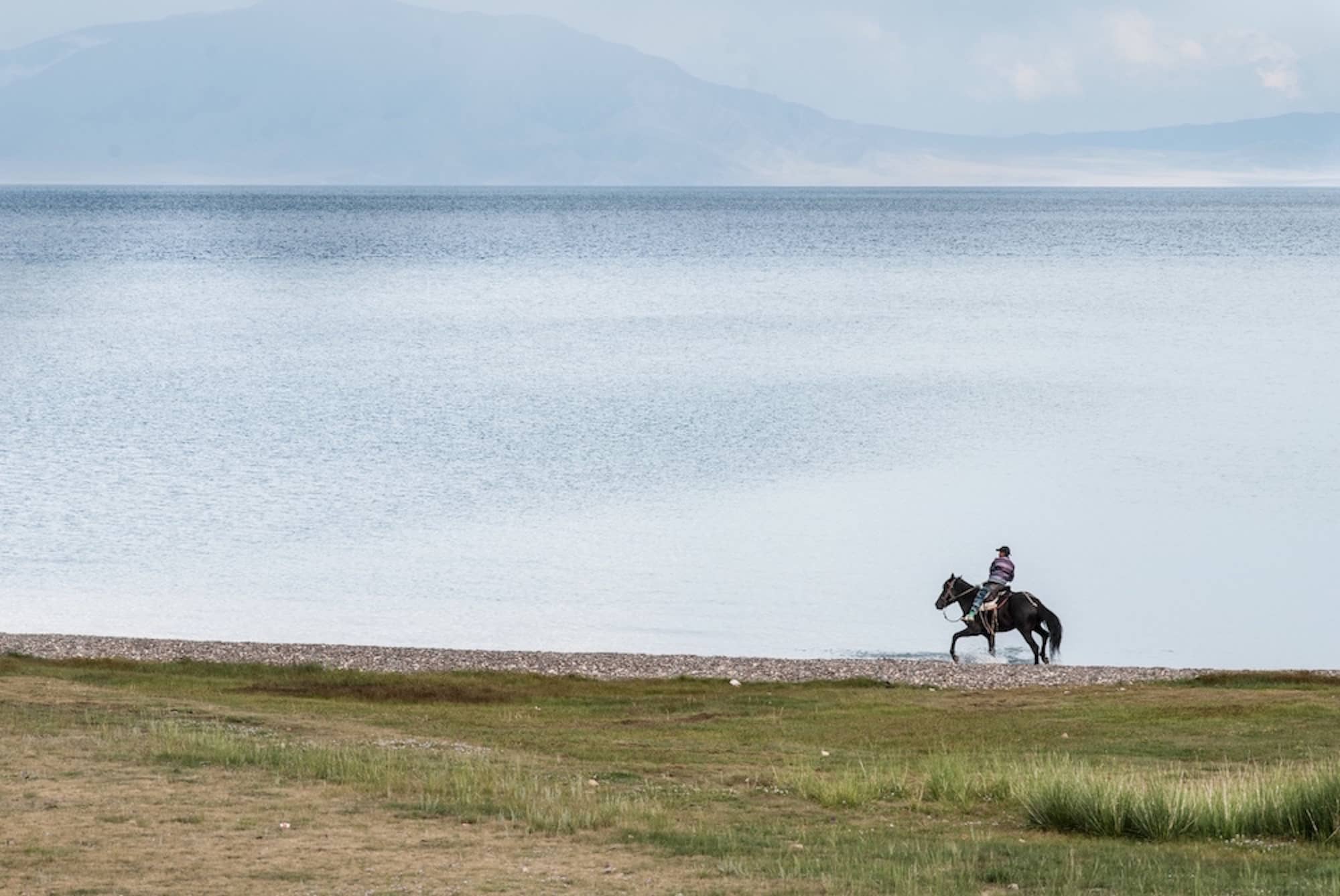Dr. Paul T. P. Wong’s autobiography, A Lifelong Search for Meaning: Lessons on Virtue, Grit, and Faith, is published in weekly installments. Stay updated here.
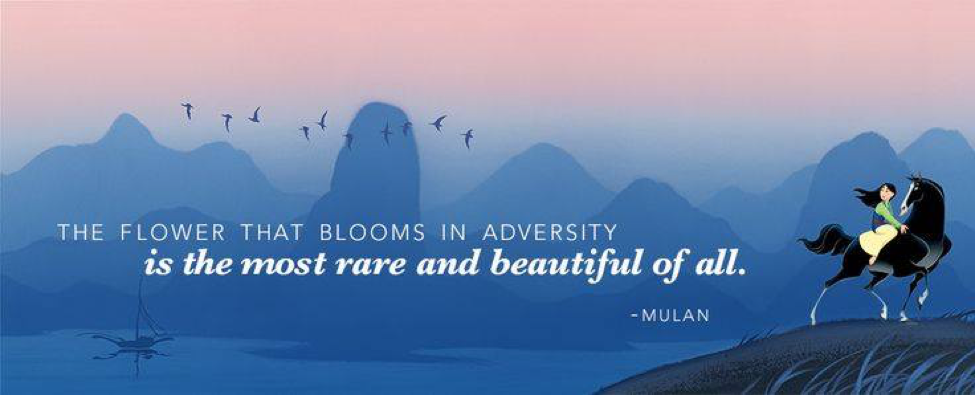
What do you expect from a girl growing up with seven boys? A tomboy.
Helen was definitely not a typical Chinese girl. I can’t recall ever seeing her dressed up or with any make-up on. She was as sharp and tough as any guy; she could more than hold her own in any company of successful men.
In many ways, she was a very precocious child. Compared to her, I was gullible and slow. She knew how to get away from my mother’s plan of molding her to be a virtuous Chinese woman in the same mode she herself was trained, that is, by duping me into doing her household chores assigned by Mother.
My sister was only two years older than I. Being the only girl in the family, one would expect her to be pampered and spoiled. The opposite was true. Father did not pay much attention to her because she did not excel in school and was not very pretty. Mother wanted to train her to be a hard-working woman from childhood; otherwise, no one would ever marry her. Thus, she was responsible for dusting certain rooms and doing some other chores. Of course, Helen felt very unhappy about this special treatment and found a way out.
Looking like Confucius
“Do you want to be like Confucius?” Helen asked me one afternoon. I was only about seven or eight years old, but I had already heard about Confucius because he was the greatest teacher to Mother, who mentioned him frequently in her mini-lessons on moral education.
“Confucius is a saint, a sage. He is very famous. Do you want to be like him?” Helen made sure that I understood the importance of her question.
“Sure, I want to be like Confucius,” I answered eagerly. That was an idealistic desire in my heart, a yearning to do something virtuous and significant.
Who does not want to be saint or sage? Who does not want to be someone special and important? Who does not want to be respected by all the people? Even a child is capable of dreaming of greatness.
Now Helen was ready for the kill. She came closer to me and said with a voice of gravity, “Okay. Do you know that not everyone can become like Confucius? You need to do good work every day.”
“Sure, that’s fine with me. I want to do good work,” I reassured her.
“That’s very good. I will show you what you need to do every day.”
She then showed me a duster, the old-fashioned kind with chicken feathers attached to one end of a rattan stick. Then she proceeded to demonstrate how to do the dusting and asked me to do it after her to make sure that I got it right.
“Is that all?” I asked incredulously. “How can I tell that I will become Confucius?”
Helen thought for one moment and then said, “Well, Confucius had red eyes. When you become like Confucius, you will have red eyes too. You need to look at yourself in the mirror from time to time.”
So I started my daily routine of dusting the furniture and looking into the mirror. Needless to say, my eyes never turned red.
The Promise of A Stone Flower
When I confronted my sister about the lack of progress, she paused for a while and came up with another bright idea. She took me to the backyard and picked up a small stone.
“Have you heard about stone flower?’ she asked. I shook my head.
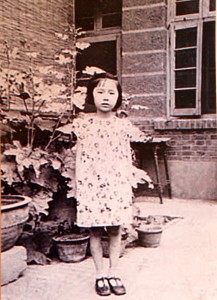 “We are going to dig a hole and bury this stone here. If you water it every day and continue to do your good work, it will sprout and bloom. You need to have faith and patience.” I was captivated by the idea of a stone flower. I agreed that I would water the stone and do my daily chores faithfully.
“We are going to dig a hole and bury this stone here. If you water it every day and continue to do your good work, it will sprout and bloom. You need to have faith and patience.” I was captivated by the idea of a stone flower. I agreed that I would water the stone and do my daily chores faithfully.
Days passed by. Much to my surprise, one morning I saw a green shoot on the spot where I sowed the stone. More days passed by, and the shoot got bigger. I could not believe my eyes! However, when I pulled the shoot from the earth, it had no roots—it was just a twig from a tree. I began to laugh, knowing that I had been had. But I was not mad at my sister at all, and I was convinced that she was a genius as much as I was a fool.
Recently, when I told my wife of this story, she laughed and said, “How could you be so gullible? Even a little child would know that a stone is an inanimate object, which can never grow.” The beauty of a child’s faith is that it is not based on reason or knowledge. A child believes in magic and miracles. No miracle ever happened in our backyard, but my simple faith can add so much hope and joy to my daily life.
I was grateful to my sister for introducing me to the joy of working. Dusting the furniture was more fun than playing with toys because it felt good doing good and working towards something great. Here is a photo my sister at our backyard, where we had many happy memories. She was about 10 years old, full of creative ideas. She was no less clever than Benedict.
Her Primary School Days
We went to the same primary school in Tianjin—Four Friends Primary School (四友小学), a private school actually founded by four good friends.
Helen was not a good student then. Like Benedict, she was more interested in what was going on in life than getting good grades. I still have the painful memory of mother screaming at Helen for her bad report cards. Back then, I learned vicariously that I needed to study hard so that I would be spared from parental displeasure and punishment. I remember that one night, when I just started a new semester, I snuck out of my bedroom to the dining room downstairs and opened up my new textbook, just to make sure that it would not be too difficult for me.
The most embarrassing experience in primary school was that I had to wear Helen’s hand-me-downs. I remember that in the winter, as soon as I arrived at the school, I would take off the winter jacket that used to belong to my sister, turn it inside out, and roll it into a bundle so that no one could see that I was wearing her coat.
My most memorable experience was my first fight. One day on the way home, my sister complained about a bully in her class. As soon as I found out who that boy was, I sought him out during recess and told him to leave my sister alone. He looked at me with a scorn on his face and then assumed a boxing stance and said contemptuously, “Do you want a fight?”
I did not feel any fear in front of this threatening opponent. Something more powerful than fear enabled me to stare back at him. Without saying a word, I instinctively delivered a quick right-hand jab that drew blood from his nose.
I was surprised that I defeated a boy older and bigger than I. Both of us were called into the principal’s office and received a major demerit point (大過) for fighting. Any student with three major demerits was expelled.
Looking back, I was and am still quite proud of my courage and fighting skill, as that boy never bothered my sister again. I was confident that the principal understood why I did what I did because she was fully aware of my good behavior and excellent academic record all through my primary school days.
Her Days in High School
When our family moved to Hong Kong, Helen studied at True Light Middle School (真光中學) an all-girls Christian school, while I went to Pui Ching Middle School, which, while it was co-ed, was attended mostly by boys because of its heavy emphasis on mathematics and science.
The two schools often held parties together for the boys to meet the girls. It was during one of these gatherings that she met Cai Yanpei (蔡炎培), a student from Pui Ching. Cai was one of her admirers. He even visited our home. Their friendship has lasted more than 60 years. Cai went on to become a famous poet and prolific writer. He was nominated for a Nobel prize in literature.
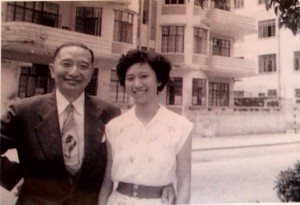 Being an introvert who preferred solitude, I never went to any of these joint events. In fact, I never went to any of my class parties in my own high school. In contrast, my sister was a very active extrovert, a ring-leader of a small group of girls. She was also active in literature circles and events and got to know a number of writers.
Being an introvert who preferred solitude, I never went to any of these joint events. In fact, I never went to any of my class parties in my own high school. In contrast, my sister was a very active extrovert, a ring-leader of a small group of girls. She was also active in literature circles and events and got to know a number of writers.
During weekends, she often told Mother that she went to visit Cao Ju-Ren, a famous writer and a family friend, for his guidance on her book. But I knew that she often used Cao as a cover; she actually met with another writer in his 30s, alone in Hong Kong as a refugee from Communist China, like many other writers. To my knowledge, this was probably her first serious love.
Here is a photo of my sister and father in front of our spacious condo on Chatham Road (漆咸道) in Tsim Sha Tsui (尖沙咀). She was about 17 in that photo. Unfortunately, we had to move to a much smaller condo shortly after because of a drastic change in our financial situation—a change that will be covered in a later chapter.
Cao Ju-Ren (曹聚仁): A Great Mentor to My Sister
Cao Ju-Ren often visited Benedict at our home and became a family friend. We knew that he was a well-known writer because we read his columns and stories in Sing Tao Daily, where he was also an editor. Little did we know that while he was in Hong Kong, he also carried an important secret mission of negotiating a peaceful solution between mainland China and Taiwan, because he was the only person highly respected and trusted by Mao Zedong and Zhou Enlai on the Communist side and Chiang Kai-Shek and Chiang Ching-Kuo on the Kuomingtang side. This political intrigue has become an important chapter in contemporary Chinese political history.
Cao was a prominent writer with a political conscience, deeply caring about the future of China. While acting as a go-between, he did not benefit personally. Throughout this period of secret negotiation between Beijing and Taipei, he remained a poor writer. For many years, he lived in Hong Kong in a small apartment, while his family remained in Shanghai. For a documentary of his life, readers are invited to visit this site.
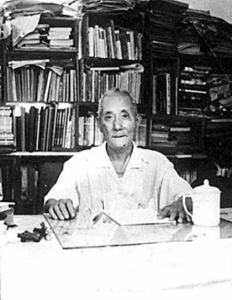 The following picture was taken in his Hong Kong apartment in 1968 (曹聚仁在香港寓所書房), with Cao looking a lot older than when I first met him in the early 50s. His home office was crowded with all kinds of daily newspapers and classic books, which overflowed into the adjacent veranda. There, he worked alone and published prolifically.
The following picture was taken in his Hong Kong apartment in 1968 (曹聚仁在香港寓所書房), with Cao looking a lot older than when I first met him in the early 50s. His home office was crowded with all kinds of daily newspapers and classic books, which overflowed into the adjacent veranda. There, he worked alone and published prolifically.
While still in high school, my sister and I visited him frequently during weekends. He welcomed our visits, probably because he missed his own children. I usually just sat there reading his newspapers or browsing through his vast collections of books. Occasionally, I would ask him questions about Chinese literature and Chinese history, which he answered patiently.
My sister was a lot closer to him. Under his mentorship, Helen wrote and published her first book just after high-school—The Notes of a Teenage Girl (少女手记) under the pen-name Wang Jing (王静), published by 創墾出版社 in 1955.
Cao took special interest in Benedict and Helen, because he was impressed with their writing talents and really wanted to provide them with guidance and support. Given his own poor financial situation, he still managed to help my sister financially while she was studying in Japan. In doing research on my sister, I discovered from my younger brother Joshua’s autobiography that in the middle of his busy shuttle-diplomacy, Cao still managed to send her money repeatedly through his literary friend 鲍耀明, who was a graduate of Japan’s Keio University (慶應義塾大學). Such generosity must have meant a great deal to Helen while she literally lived on bread and water. There was something very beautiful and moving about an old mentor who goes out of his way to support a young protégé.
I really felt sorry for Cao, watching him writing endlessly with longhand, and living in such an old and small apartment. I remember clearly how Benedict often said that when he became established as a writer, he would definitely not want to live in poverty as Cao Ju-Ren. It was so sad that at the end Cao died in Macau alone, without his family. What a tragic ending to a great writer in China!
Her University Days
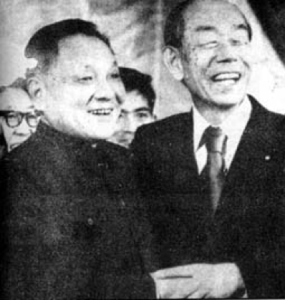 After a short stint in Asian University to improve her Japanese, she was admitted to Waseda University as the first female student in an all-male university. She studied in the Department of Political Science and Economics and claimed that many political leaders in Japan were her classmates.
After a short stint in Asian University to improve her Japanese, she was admitted to Waseda University as the first female student in an all-male university. She studied in the Department of Political Science and Economics and claimed that many political leaders in Japan were her classmates.
She was very proud of two achievements during her university days. The first was that she was chosen as the translator for Deng Xiaoping, during his historical visit to Japan as the first Communist Chinese leader to do so. Here is Deng with Japanese Prime Minister Kakuei Tanaka during his first visit to Japan.
Her crowning glory in Waseda University was the privilege to deliver a valedictorian speech before 30,000 cheering students. That was an amazing achievement for a Chinese foreign student who started learning Japanese just four years ago.
1959—A Turning Point in Her Life
Shortly after his graduation, at the age of 24, she decided to marry Chao Chun (趙纯), a prominent Chinese businessman in Tokyo and the president of Asian University. He was a 45-year old divorcee with children from a previous marriage.
From what I learned from sister years later, at that time Chao owned many parcels of valuable real estates in downtown Tokyo and was involved in rebuilding post-war Japan. He owned a shopping mall, a theatre, and a hot-spring resort and produced a popular brand of bathroom equipment (生產衛浴設備) in addition to being the president of Asia University.
What attracted Chao Chun to Helen was probably her vitality and ability. With her degree in politics and economics and her youthful energy, she could be a real asset in his expanding business-industry empire.
On her part, she faced a fork in the road. I can visualize her sitting alone in her small student’s residence, pondering her future and struggling to make a major life-changing decision. It was a choice between security and uncertainty, wealth and poverty, an established older man and a young struggling reporter.
She chose the former and that made all the difference in her life and mine. I can fully understand why she gave up her young suitor in favour of a very wealthy older man. After years of living in poverty, an opportunity to instantly step into the lifestyle of the rich and famous was difficult to refuse. I suspect that her desire to save her family from poverty might have also been an important factor in her decision.
Before they got married, they came to Hong Kong and visited my parents. Chao bought my parents a new condo in a Hong Kong and gave my father enough money so that they could live comfortably. Shortly after her marriage, Helen gave me one thousand US to study in the States or Canada. That generous gift completely changed my life.
At that time in the 50s, I was just one of many high school graduates, working a low-paying job, without any prospects and without a future. My only satisfaction was writing for Christian periodicals and carrying on the ministry of the Navigators as a volunteer after they had closed down their Hong Kong office.
I was absolutely ecstatic after receiving the offer from Helen. But after the initial excitement died down, I was troubled by the thought that the money might have come from “less than honourable business activities” because I was not clear about the nature of Chao’s vast business empire. When I shared my qualms with Helen, she and Chao Chun just burst out laughing. They reassured me that their money was 100% clean. I still feel embarrassed by this incident, which really reflected my narrow fundamentalist Christian morality as a young Christian.
In her new role, Helen faced a novel challenge and rose to the occasion. On the home front, she was a mother to her step-children (including a disabled child) from Chao Chun’s previous marriage and gave birth to two boys. On the business front, she was involved in managing a couple of companies. With Helen as a competent partner, Chao’s business continued to expand and diversify.
Reversal of Fortunes
Together, Helen and Chao had a great life. In 1973, they migrated to Vancouver and settled into their new home. Unfortunately, not long after this big move, Chao Chun started to show symptoms of Parkinson’s disease, which degenerated progressively. He passed away in 1980.
Helen’s problem in Canada was compounded by the recession and sky-high mortgage rates in the 80s. As a result, the bank foreclosed on her residence and an investment home in West Vancouver. Once again, she was reduced to poverty and had to struggle to raise her two boys and one girl born in Canada.
She moved to a much cheaper place and only had enough money to purchase a corner store business in the Eastside of Vancouver, where customers came to purchase one or two cigarettes rather than a package. She literally counted pennies and worked long hours seven days a week. She had to start from scratch again and raise a family as a single mom without any help.
I am glad that I was able to return her $1,000 during this difficult time, but that was a just a drop in a bucket, considering the expenses of raising a family and putting her two boys through university. But she did not complain, she did not give up, and she cheerfully worked hard and made friends with her customers in the neighbours—the poor people, the homeless addicts, and the drunkards.
Growing Old is not for the Faint Of Heart
From time to time, I still talk to my sister on the phone. We miss each other because we have always been close. Of all the siblings, we two look the most alike, and we share many things. The bond between us is part of what makes our family so important in our lives. Through all the vicissitudes of life, we can always count on each other.
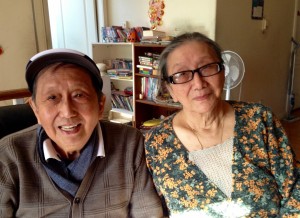 Recently, I visited her in Vancouver, shortly after her 80th birthday. This photo was taken at her modest home, which she shared with her daughter, son-in-law, and grandchildren. In her old age, with all kinds of health problems, such as diabetes, hypertension, and pain from a previous fall and injury, she was barely mobile and stayed home most of the time. Yet, she still cooked for her two grandchildren and her daughter, who is handicapped by a weight problem. Her two sons are both well-established. Her only concern was that her teenage grandchildren would get into trouble.
Recently, I visited her in Vancouver, shortly after her 80th birthday. This photo was taken at her modest home, which she shared with her daughter, son-in-law, and grandchildren. In her old age, with all kinds of health problems, such as diabetes, hypertension, and pain from a previous fall and injury, she was barely mobile and stayed home most of the time. Yet, she still cooked for her two grandchildren and her daughter, who is handicapped by a weight problem. Her two sons are both well-established. Her only concern was that her teenage grandchildren would get into trouble.
Both of us are now near the finish line of our earthly journey, with our childhood memories far behind us like a distant haze, where our lives back then now seem like a dream.
During the visit, we sat in silence for a while, looking at each other thoughtfully. There was still some spark in her eyes, indicating the presence of her trademark quick mind. A montage of significant moments of her life passed before my mind’s eyes.
I wondered whether she had ever regretted marrying someone much older, only to be widowed at the young age of 45! I also wondered whether she had ever regretted giving up her own dreams for the more traditional role of being the wife of a rich man and devoting most of her life to raising children and grandchildren.
We reminisced a little while and then talked about her present life. She went to her bedroom and brought out her Chinese Bible. “I am able to get through everything because I read the Bible every day and believe in God’s help,” she said. She was also most grateful for her younger brother Joshua who sent her money from time to time.
The only time she came fully alive was when she talked about her old friend Cai Yanpei. She pulled out a recent letter from him and said, “He sent me $2,000 to help me out with my recent financial difficulties, even though he himself does not have much.”
After more than 60 years, both were widowed. They were still able to bring joy and comfort to each other through correspondence or long-distance phone calls. She seemed to enjoy my teasing her about her great love story of the century. “But we have never even held hands,” she said.
Even though she looks like an ordinary old woman, she has actually lived an extraordinary life. She has adapted well to both opulence and poverty. She has helped her husband to reach the zenith of his career and raised three sets of children. But now, she is struggling with financial and health problems.
At the end, she does not have much to show for her achievements or contributions. But to me, she will be forever remembered for her generosity all through her life, and particularly her scholarship gift that changed my destiny. One of my unfinished dreams is to set up a foundation so that I can provide scholarships to poor but deserving students so that I can help many others like me. This foundation would be named after her.
We are all born, live, and die. What do people really want in this brief and difficult life? Everyone is after happiness and a sense of significance the way they see it. But most people either pursue their dreams like moths flinging themselves toward a flame or waste their lives in a wild goose chase.
We all believe that there is more to life than mere existence, but what, exactly, is the “more” that will make us feel fully alive even in our old age? I really hope that Helen has found the answer, that she has finally found peace in her heart in spite of all her misfortunes and sorrows.
